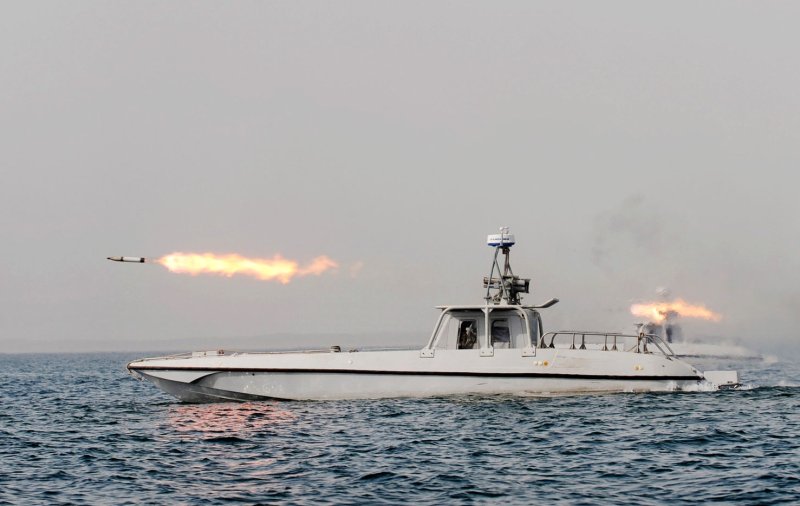1 of 4 | An Iranian navy boat fires a missile during an Iranian military exercise on the Sea of Oman, near the Strait of Hormuz in southern Iran on December 30, 2011. Iran has threatened to close the strategic oil waterway if sanctions are imposed on Iran for its nuclear ambitions. UPI/Ali Mohammadi/IIPA |
License Photo
TEL AVIV, Israel, Feb. 1 (UPI) -- China, contemplating the possible disruption of oil supplies from Iran, appears to be making moves toward cementing its links with energy newcomer Israel, a move that could outflank the United States in the Middle East.
One strategic joint venture that's being mooted is a Chinese-built rail line across the Negev Desert from Haifa, on Israel's Mediterranean coast near newfound offshore gas fields, to Eilat on the Red Sea, Israel's maritime route to Asia.
This has emerged following a little-noticed exchange between Israel and China last week to mark the 20th anniversary of diplomatic ties between the countries.
Chinese Premier Wen Jiabao said his country and Israel have "huge potential and broad prospects for cooperation" that Beijing "is ready to continue to expand and deepen."
"Clearly, Israel and China are poised to enter a profound and highly strategic engagement," observed veteran analyst M.K. Bhadrakumar, a former Indian ambassador to the Soviet Union, Pakistan, South Korea, Kuwait and Turkey.
Israel, which since its foundation in 1948 has been without energy resources, now finds its economy, and likely its foreign policy, about to be transformed. The deep-water fields off its Mediterranean coastline in the Levant Basin contain reserves estimated at 25 trillion cubic feet of gas, far exceeding Israel's domestic needs.
Economists estimate gas receipts will earn Israel $2 billion-$3 billion a year, with the country managing a sovereign wealth fund of $10 billion by 2021.
And the energy riches are likely to go on growing. The U.S. Geological Survey estimated in 2010 that the Levant Basin, an area of 32,000 square miles that includes Lebanon, Syria, the Gaza Strip and Cyprus, could hold 122 tcf as well as 1.7 billion barrels of recoverable oil.
These developments coincide with a new thrust by China to develop stronger ties to Saudi Arabia and the other Arab monarchies in the Persian Gulf amid the confrontation between Iran and the West in the oil-rich region.
Wen made a high-profile, six-day tour of Saudi Arabia, the United Arab Emirates and Qatar last week. It was the first Saudi visit by a Chinese premier in 20 years and the issue of energy supplies was undoubtedly top of the agenda.
"Having developed strong interests on the two sides of the Persian Gulf divide -- the Gulf Cooperation Council states and Iran -- China is taking an awesome leap as a big-time player in the geopolitics of the Middle East by elevating its ties with Israel to a strategic partnership," Bhadrakumar noted.
"Paradoxically, just as the United States is hoping to nettle the dragon in the South China Sea and 'contain' it in the Asia Pacific, China makes a dramatic, outflanking appearance in the citadel of American geostrategies in the Middle East," Bhadrakumar wrote in Asia Times Online.
Analyst Peter Lee, who specializes in Asian affairs and how they intersect with U.S. foreign policy, says expectations are the United States will become almost self-sufficient in energy by 2030 due to exploitation of shale oil and gas resources will free it of dependence on Middle Eastern oil.
That, he argued, is "bad news for Israel and Saudi Arabia, both of which rely on United States backing to buttress their shaky fortunes in the region."
These fortunes "have become more perilous with the advent of the Arab Spring and the evaporation of local authoritarian and/or pro-U.S. regimes that were quite happy to coexist with Israeli high-handedness and narrow Saudi autocracy."
Israel sees a joint venture with China to transport Israeli gas to Eilat, the Jewish state's only port with direct access to Asia, as a hedge against an uncertain future as U.S. power wanes in the region.
This route also sidesteps the choke point Strait of Hormuz which Iran has threatened to block, cutting off one-fifth of the world's oil supplies.
During Wen's Saudi visit, he signed a deal for the China Petroleum and Chemical Corp to build an $8.5 billion export refinery to handle 400,000 barrels per day at Yanbu, on the kingdom's Red Sea coast, thereby also bypassing Hormuz.
The outline of a new energy infrastructure in the region, oriented primarily to China and other Asia consumers rather than to the West, thus starts to emerge.















